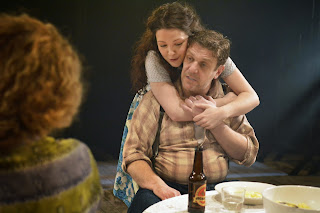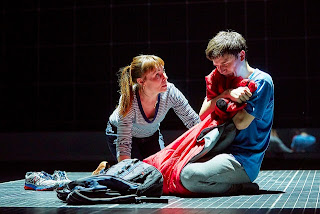I’m back again making myself at HOME for another segment of the ever impressive Re:play, and I am truly starting to appreciate why the festival has featured the pieces it has. Fluid writing and strong acting is without question, but the real quality of the festival’s programme is that the work gets the audience talking. And if I where to put money on it, I would bet Deaf Dog’s production of Spur of The Moment would top the list of the most confabulated. Written by Anya Reiss at the tender age of 17, it is a play in which its characters are simultaneously toyed by relationships and distance, power and weakness, their truths and lies, all as a result of their desires. It's is a perfect recipe for controversy, and makes for delicious audience commentary.
Delilah (Tilly Slade) has all the traits of a 12 year old: sleepover parties with her friends, imitating High School Musical and looking forward to her 13th Birthday. Just rooms away her parents, Nick (Darren Kemp) and Vicky (Joi Rouncefield), are at loggerheads again over Nick’s recent affair with his ugly, older boss – and to make matters worse, was soon after made redundant. Financially stressed and frustrated the couple take in a 21 year old lodger, Daniel (Jack Alexander) who falls between being a pawn in the parental battle and more disconcerting, a subject for Delilah’s pubescent fancies. The concurrent theme is staged by the clever use of two transferable doors; these serve to both represent the divide of narratives and crossing of boundaries. A moment that I thought worked particularly well is when Daniel storms between his own room, currently inhabited by his visiting girlfriend (Lucienne Browne) and the room of a now devoted Delilah. A growing danger is evident as Daniel crosses the boundary into Delilah’s room for the first time in the play. Another interesting notion I found was in the direction of Nick and Vicky and their battles over tea and cloths. The direction of petulant impersonations, “shut ups” and temper tantrums, cast an irony over the seemingly ‘adult’ relationship of the play. This is then exaggerated when Delilah ultimately makes the most conscientious decision and sacrifices what she thinks would make her happy. Spur of the Moment has an infectious blend of comedy and tension to make you hold your breath or curl your toes. Arguably it sets out to shock, but has an underlying hybrid of “you can’t always get what you want” and “be careful what you wish for”. One thing is for certain – it will get you talking. Words: Kate Morris Image: Courtesy of HOMEWednesday, 21 January 2015
Tuesday, 20 January 2015
A View From The Bridge @ Bolton Octagon, 16.01.14
A View From The Bridge, by Arthur Miller, is all about the destructive power of that oldest and ugliest of emotions: jealousy. Centred around Eddie Carbone (Colin Connor), his wife Beatrice (Barbara Drenna) and their niece Catherine (Natasha Davidson), the story takes place along the shores of the East River in the shadow of the Brooklyn Bridge.
There is plenty of mirth in Miller's play, especially in the opening act where the family kid each other in an atmosphere of contentment. But this is not the perfect cookie-cut American family by any means, and once Beatrice's relatives from Italy arrive hidden feelings begin to creep out, like cockroaches from behind seemingly pristine wallpaper. Eddie is jealous of Catherine's interest in the newly arrived Rodolpho (Tristan Brooke), and once that indecent dynamic is established the play careens towards its inevitable and unhappy conclusion. Some of the cast were familiar from recent Octagon performances and, like in those, here they delivered work of very high standard. Connor as patriarch Eddie managed to take us on his difficult journey without being overblown, while Drennan as his wife showed suitable levels of nervous stress. The accents, be they Italian or American, were pretty much spot on, which is always a relief for the audience and a considerable achievement for the actors. Building up momentum as it goes, it is easy to see why this particular Miller play is held in such high regard and why the Bolton Octagon has put it on. Much has been made of director David Thacker's connection to Miller, and his assured hand delivered a performance that was visually interesting, emotionally engaging and a credit to his friend's play. In some ways the story seems dated, with the female characters being expected to bow before patriarchal pressure. But while that might not be the way in most households, there are still many women whose choices are taken away by overbearing male figures, and this play is a reminder that while western society has come along way it is not a rising tide that has raised all boats. A strong start to 2015 for the Octagon. Words: Andrew Anderson Images: Ian TiltonMonday, 19 January 2015
JB Shorts @ Re:play, 14.01.14
Re:play has returned to serve up seconds of 2014s most delicious pieces of fringe theatre and, with the four course banquet of JB Shorts on the menu, how could I resist? Diets are short lived anyway! The collection of 4 fifteen minute plays are taken from the sold out JB shorts 11 and 12 programmes, and are written by established comedy and drama writers: Jane McNulty, David Isaac, Justin Moorhouse and the collaborative Peter Kerry and James Quinn.
Our petite fours start with the dark and intriguing A Hairline Crack. The piece explores the relationship of two women, living amongst vast tea sets they have hoarded for an un-pursued business venture. Button (Cathy breeze) is trapped in the residence due to immobility, but she gains power and control over Ronnie (Tigga Goulding) by vindictively questioning her whereabouts, making demands and ultimately smashing her dreams. The piece moves with naturalistic normality with an underlying dark motive that surprises both Ronnie and the audience. Moving to our main course is the full and rich Paradise Island. Abdullah (Abdullah Afzal), an immigrant looking for work on the island, is near banished, until the King (Richard Hand) is besotted with Abdullah’s wife Liz (a show stealing teddy bear). The piece is wonderfully funny but I imagine not to everyone’s taste particularly when the audience are asked to shout the dreaded ‘he’s behind you’. The piece is a guilty pleasure because the components work – a witty script with pace, a cast with impeccable comic timing, and effective audience interaction. Moorhouse’s serving is Leaky Bacon, the story of a family of women from three generations. Linking together their interactions are monologues, delivered by each character that shares personal insight into their life, secrets and feelings as well as those of the other characters. The script has clear inclination of something truthful and moving but I feel doesn’t have the opportunity to truly flourish in the short time frame. A Great War is the final offering; a parody of a ‘highlights segment’ of rolling news show depicting the best bits/updates of WWI. The writing is brilliant, bountiful language and hilarious responses get the style and characteristics of the era, with the whole thing executed perfectly by newsreaders Nicolas (Arthur Bostrom) and Victoria (Victoria Brazier). Full and satisfied from the smorgasbord of theatre, it’s obvious to me why JB appears on the Re:play bill: because variety is the spice of life. Words: Kate Morris Images: Courtesy of HOMEMonday, 12 January 2015
The Curious Incident of the Dog in the Night-Time @ The Lowry, 09.01.15
Mark Haddon's novel The Curious Incident of the Dog in the Night-Time received a lot of attention when it was published. This was partly because it was a very good book, becoming a best seller, but also because its central character is a boy (Christopher) with a condition on the autism spectrum. Some overlooked the fact that the character is clever, charming and complicated and focused instead on this label. The stage adaptation, first running in the West-End and now on a national tour, makes this mistake impossible to make, portraying Christopher as the one label that definitely applies: human.
For those who have not read the book, a brief preamble: Christopher discover his neighbour's dog has been killed, and decides - against the advice of his Dad and his teacher - to try and find the killer. This leads him on an unexpected journey into his past, along with difficult confrontations in the present. As Christopher doesn't like strangers or being touched, and finds the sensory overload of the modern world hard to cope with, these are plentiful and make for both funny and painful viewing. The successful portrayal of Christopher is key to the play and, in Joshua Jenkins, the production has an actor who can meet the demands of the role. Jenkins has Christopher's character down, from the constrained movements he makes to the liberated flights his imagination takes. The supporting cast, particularly his school teacher played by Geraldine Alexander, help deliver on the promise of Haddon's story, depicting both affection and infuriation with Christopher that mirrors the audience's own response. The staging breaks Christopher's world down into lines like an electronic graph paper, showing the mathematical lens through which he understands reality. It also makes for a very playful space, one which can light up and be drawn on, and that the audience must use their imagination to make whole. Cute moments, like the chorus animating objects Christopher finds under his Dad's bed or acting out the private lives of his various neighbours at double speed, are inventive and slightly twisted, much like Christopher's own interpretation of events. All of this, accompanied by the strong performance of the cast, indicates a director - Marianne Elliott - at the top of her game, taking an already strong text and translating it with her own twists and touches to taste. Given the popularity of the book, and the acclaim the play has already accumulated, tickets for the rest of the tour are probably hard to come by. But, given how good this play is, it is well worth trying to get them. Words: Andrew Anderson Images: Courtesy of The Lowry





